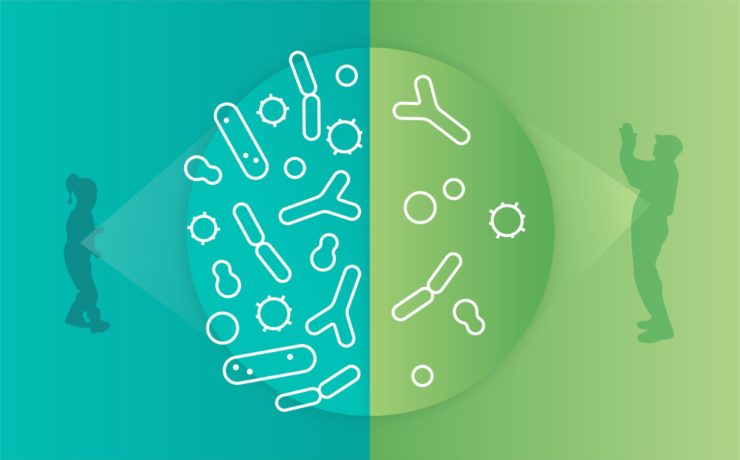
What is the Microbiome?
Our body is inhabited by trillions of bacteria, fungi, and viruses which collectively live on and in our body as a community known as microbiota. Their genome is the microbiome.

The global population is aging and, as life expectancy increases, individuals are faced with several health challenges. According to the United Nations, “by 2050, one in six people in the world will be over age 65 (16%), up from one in eleven in 2019 (9%)…The number of persons aged 80 years or over is projected to triple, from 143 million in 2019 to 426 million in 2050.” One factor that impacts a person’s health and wellbeing while aging is changes in microbiota. A decreased diversity of gut microbiota is associated with the progression of immune deterioration during the aging process [1]. Immune system alteration is one of the most common aspects of aging and includes dysregulation of inflammatory biomarkers and a decline of immune function, which leads to a chronic systemic inflammatory state [2]. Aging brings several health challenges, and consumers are eager to prevent them to benefit their wellbeing.
Consumers try to slow down the aging process by purchasing products with health claims such as “immune health”. FMCG Gurus report that 46% of consumers in the USA have made changes to their diets in the last couple of years to boost their immune system. Product innovation has risen to meet this demand and, according to Innova Market Insights, from 2015-2019 there was a 15% CAGR growth in products with an immune health claim and almost doubled from 2017 to 2019. Immune health continues to be a trend that consumers seek to learn more about and strengthen with nutritious products.
The immune system is a complex system that involves responses to internal factors such as genetics, but it also interacts with external factors such as diet, sleep, exercise, and other habits. Proper nutrition is essential in ensuring a good quality of life for older demographics. Diets including pro and prebiotics along with a healthy lifestyle and exercise can help maintain some immune biomarkers in the elderly population [1]. GOS, a type of dairy-derived prebiotic, has been shown to positively affect gut microbiota and help support the immune system in elderly adults aged 65 to 80 years old; evidenced by an improvement in NK cell activity which plays a crucial role in the human innate immune system [3]. Special dietary formulations with prebiotics, such as GOS, can help support the immune functions in the elderly population.
Learn more about VITAGOS™, a GOS containing syrup
[1] Vaiserman AM, Koliada AK, Marotta F. Gut microbiota: a player in aging and a target for anti-aging intervention. Ageing Res Rev 2017, 35: 36-45.
[2] Franceschi C, Campisi J. Chronic inflammation (inflammaging) and its potential contribution to age-associated diseases. J Gerontol A Biol Sci 2014, 69: S4-9.
[3] Vulevic J, Juric A, Walton GE, Claus SP, Tzortzis G, Toward RE, Gibson GR. Influence of galacto-oligosaccharide mixture (B-GOS) on gut microbiota, immune parameters and metabonomics in elderly persons. Br J Nutr 2015, 114: 586-595.